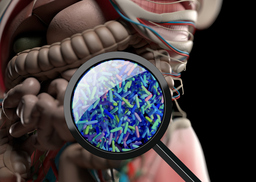Microbial Metabolites for Improving Cancer Immunotherapy
TECHNOLOGY NUMBER: 2021-483
Tags:

OVERVIEW
A novel combinatorial therapy that will improve cancer patient outcomes- The dietary fiber inulin modulates the gut biome to increase beneficial metabolites
- Induces memory T-cell responses that act synergistically with immune checkpoint blockers
MODALITY
Orally administered dietary supplement / adjunctive therapy
INDICATION
Cancer; enhancement of immune response in patients receiving immune checkpoint blockade therapy
PUBLICATIONS
- "1096 Microbial metabolite-derived oral prodrug reprograms T cell metabolism and improves cancer immunotherapy"
- "Generation of systemic antitumour immunity via the in situ modulation of the gut microbiome by an orally administered inulin gel"
INTELLECTUAL PROPERTY
Patent pending
BACKGROUND
Gut microbiotas secrete small molecular weight metabolites that can influence growth, development, and reproduction of other beneficial organisms as well as increasing communication between cells. Microbial metabolites have been identified as potentially being therapeutic in diseases as varied as allergies, obesity, GI tract maladies, and cancer. Initial clinical studies have suggested that microbial metabolites, including tryptophan, short-chain-fatty acids, and bile acids, may act as the potential link among gut microbiota, tumor cells, and systemic immune response. Studies in preclinical tumor models and in cancer patients have demonstrated that the composition of the intestinal microbiota influences the effectiveness of anticancer drugs.
Gut microbiotas are specifically linked to the response rate to immune checkpoint blockers (ICB) in cancer patients. These microbial metabolites may act as a link among gut microbiota, tumor cells, and systemic immune response. However, studies to this point have failed to reveal the causal relationship between microbial metabolites and therapeutic efficacy. In particular, it remains unclear whether these beneficial metabolites, also known as postbiotic, can synergize with specific ICB. Thus, a need exists for the development of microbial metabolite-based postbiotic formulation with controlled release for improved anti-tumor T cell immunity in ICB therapy.
INNOVATION
Researchers have discovered that inulin, a widely consumed orally administered dietary fiber, can serve as an effective antimetabolite in treating cancer. Inulin modulates the gut microbiome to increase metabolites of short-chain-fatty-acids 3,4-dihydroxybensoate (DHB) and 3-methylhistidine. These metabolites can induce central memory T cell differentiation, improve T cell survival, and stimulate the anti-tumor activity of a known checkpoint inhibitor named anti-programmed cell death protein-1. This reaction successfully induces systemic memory-T-cell responses which then act synergistically with ICB to slow the progression of tumor growth.